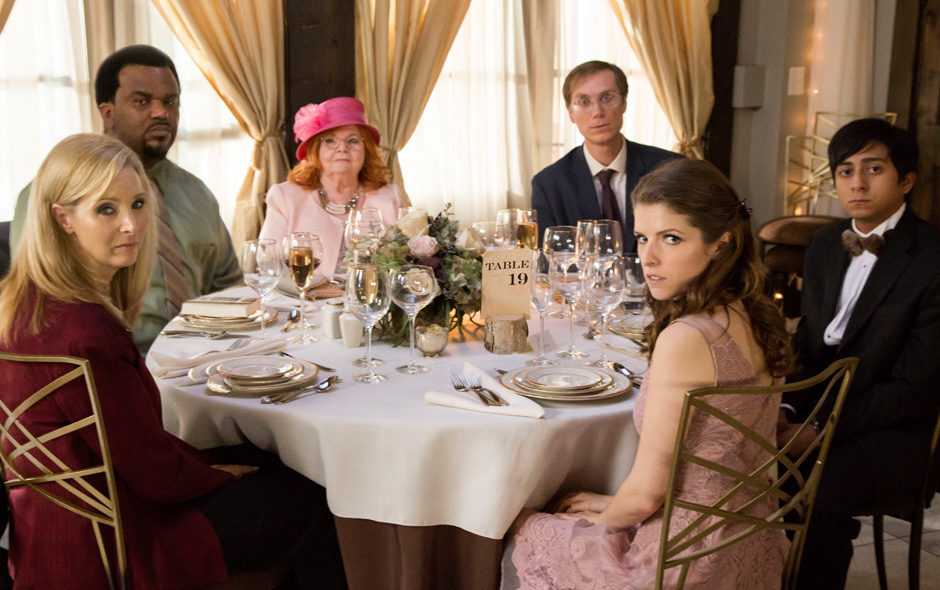The sentimental and semi-funny Table 19 plays into the spirit of John Hughes movies by transplanting its ensemble of unlovable misfits from the high-school detention of Breakfast Club to a wedding.
Stuck at the back of the reception are the unwanted guests of table 19, who, in the words of the bride’s oldest friend Eloise (Anna Kendrick), should have known better than to attend. Eloise was unceremoniously dumped by the bride’s brother via text and kicked out of the wedding party, which is why she’s at Table 19.
There’s also Walter (Stephen Merchant), the sociopathic extended family member serving time in prison for stealing $125,000 from the bride’s father. Bina (Lisa Kudrow) and Jerry (Craig Robinson) are a couple who own a diner together and whose marriage is on the rocks. Jo (June Squibb) is a long-forgotten nanny who served the wedding family years ago, and Rezno (Tony Revolori) is an awkward teenager desperately trying to lose his virginity.
There’s a bit of hostility and suspicion at table 19 as each person tries to figure out exactly why they’ve been stuck at the loser table, but in due time they bond together, particularly as they become witness to the love woes of romantic lead, Eloise, and the awful treatment she receives from her ex, Teddy (Wyatt Russell). There’s nothing quite like the shared experience of accidentally ruining a wedding cake to bring people closer together.
Many of the jokes in Table 19 are a bit too on the nose – watch as Rezno repeatedly fails to flirt with a girl until an adult has to butt in and tell him to leave – but some very good gags do get in, such as Bina’s blazer matching the servers, causing many of the hotel staff to keep enlisting her help in service. Screenwriting brothers Mark and Jay Duplass know how to keep the film’s humour steadfastly committed to character development.
As much as the movie may present itself like its own kind of misfit – an outdated style of comedy that relies heavily on the “adorkable” quirkiness of its characters – the film is actually written with an emotional intelligence and depth that gets us to believe in and cheer for each character and their respective subplots.
That’s what differentiates Table 19 from the mould of other quirky comedies. While it’s just as guilty of shoehorning in dramatic foibles to make us sympathize with its characters, the film is self-aware of the contrivance. So it keeps the stakes fairly low, and we’re instead asked to just hang out with these people as they figure out their problems together.
It’s not entirely obvious at first glance, but Table 19 is a romantic comedy. It is set entirely at a wedding, after all, and Eloise’s romantic entanglements form the centrepiece of the film. However, at no point does Table 19 seem interested in making Eloise a drama queen, and the film does a good job of deconstructing some of the generic clichés of the rom-com.
A dark and handsome wedding guest named Huck whisks her off her feet during a wedding dance, for example, which helps to reveal how much Teddy actually misses Eloise. But as more than one character points out, no one’s named Huck anymore, and the mysterious stranger becomes just another man to disappoint Eloise before disappearing off into the night. Her newfound friends help her reach new understandings about her love life, even when their attempts to help aren’t exactly, well, helpful.
Table 19 is based on a similar idea explored in Silver Linings Playbook: that human beings are inherently flawed, and our only recourse in finding companionship is to try to be understanding of others’ faults, and find people who will equally accept us for our warts and quirks. It’s not a complicated or original idea, but one that Table 19 manages to express on genuinely heartfelt terms. You can’t hate a movie that courageously wears its heart on its sleeve.

